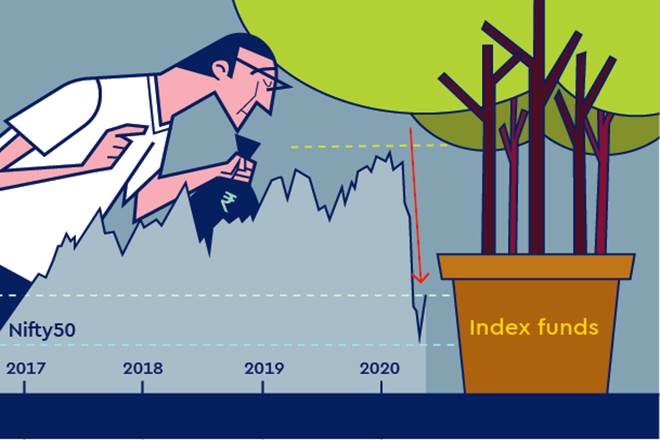At a time when the stock markets have seen a sharp fall since the outbreak of Covid-19 pandemic and prices of many shares have hit their multi-year lows, investors have to select stocks of those companies which have a fundamentally strong balance sheet. However, instead of looking at select companies, an investor should ideally invest in index funds, which will have stocks of market leaders across different sectors.
Index funds invest in stock market indices in the same shares and in the same proportion. These funds are passively managed and the fund managers’ intervention is very limited. The asset allocation of an index fund would be the same as that of its underlying index. As the expense ratio of index funds is lower (10 to 50 basis points) than other actively managed funds of asset management companies, returns generated can be higher in the long run. In the current market volatility, passive investments can help an investor to mitigate the unsystematic risks—betting on few select stocks going wrong.
Rajat Jain, chief investment officer, Principal Mutual Fund, says that from a volatility perspective, index funds would also be impacted by the current volatility in equity markets similar to actively managed equity funds. “The decision to invest in an index fund should be based on the investors’ risk appetite and comfort with the near term volatility. Investors looking to take exposure to the equity market and who don’t want to take risk of near term underperformance from an actively managed strategy may certainly look at these,” he says.
Similarly, Omkeshwar Singh, head- RankMF, Samco Securities, says that in the current Covid-19 pandemic situation the selection of quality businesses has become very important for the future growth and wealth creation. “If investors are not able to select quality equity mutual funds schemes, then index funds are a better option,” he underlines.
Selecting the index.
As the current market scenario is complex and the dynamics change very fast, investors must carefully select the index. Ideally, an investor should invest in diversified funds like Nifty or Sensex funds. If an index fund is benchmarked to the Nifty, the portfolio will constitute the same 50 stocks as the benchmark. Individual investors who are not market savvy should stick to index funds for convenience, liquidity and ease of investing.
“An average investor should look at an index fund that tracks a broad market index rather than funds that track a sector, a theme or a narrow market cap,” says Jain. On a similar note, Singh advises investors to invest in index funds of leading indexes of Nifty 50 and Sensex 30 considering the volatility in equity markets.
Returns in sync with the index
An index fund investor can be assured of returns in sync with the indices. The only difference in returns would be on account of tracking error. Lower the tracking error, the closer the returns are to the benchmark. So, an investor must select funds with minimum tracking error before investing in an index fund. These funds set aside a certain percentage in cash to ensure that, in the event of redemption request from investors, there is sufficient liquidity.
An index fund helps an investor balance risks in the portfolio as the fund matches its performance to that of its index. If an investor does not want to take risk of near-term underperformance and is expecting predictable returns, he should look at index funds. As such funds can see short-term fluctuation, investors must stay invested for the long term for the fund to generate higher returns.

